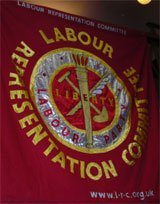More than 200 delegates and visitors met at
the Conway Hall on Saturday November 15th for the Annual Conference
of the Labour Representation Committee, the organising hub of the left wing
within the Labour Party and among trade union activists. There was a determined
mood among those meeting. After years of right wing drift and domination of the
labour movement, LRC members rightly felt that the crisis had brought out the
urgency for socialist ideas to be heard and taken up. The Conference was opened
by a stirring speech from Tony Benn
In the morning Darrall Cozens moved a
resolution on behalf of ‘Socialist Appeal’, calling for nationalisation of the
entire banking system and of land and the building industry under workers’
control and management. This would enable us to build the houses we need. The
demands, based on the programme of the IMT published on this website, went on
to call for nationalisation of the energy companies and a socialist plan of
production. The resolution was passed overwhelmingly.
Jeremy Dear, General Secretary of the
National Union of Journalists, made a fighting speech which we are publishing
in its entirety. Matt Wrack, General Secretary of the Fire Brigades Union,
brought fraternal greetings from his union. He denounced the bank bail-out as
the “socialisation of losses.” “We did not create this crisis,” he went on,
demanding no repossessions and a programme to build social housing. Criticising
the drive to privatisation and PFI he declared that “if the bankers can’t run
their own industry, don’t invite them in to run anything else.”He was not
ashamed to advocate the ‘n’ word – nationalisation – and concluded by warning
the boss class, “Your system created this mess, your system should pay.”
 Similar conclusions were drawn by Katy
Similar conclusions were drawn by Katy
Clark, MP for North Ayrshire and Arran. “If you can find the money to prop up
the system,” she pointed out, “You can find the money for the workers.” She
praised the retention of the Post office card account by Royal Mail as a small
but important victory for working class pressure, but pointed out we have a
long way to go. A century later, “We have less trade union rights than we did
at the time of Taff Vale” (the anti-union court case that caused the trade
unions to set up the Labour Party in the first place).
In the afternoon Conference rejected a
resolution from the Alliance for Workers’ Liberty which called for the LRC to
become a Workers’ Representation Committee, using trades councils and other
bodies to campaign for “a political voice for the working class”. Their
resolution denies that the working class has a political voice – called the
Labour Party – and calls upon us in effect to campaign to set up a new workers’
party. In a sharp debate delegates pointed out that the resolution was in fact
calling upon the LRC to commit suicide. Ian Aylett pointed out that the AWL
resolution would achieve what the right has always wanted. “The right wing
wants us out.” The question we should be asking instead is, “Why won’t the
trade union leaders support John McDonnell?”
Solid programmatic resolutions were passed
on the Royal Mail, trade union rights, housing, public transport and education,
and against the threat of racism and fascism. Conference did not neglect the
internationalist duty of socialists, with fraternal greetings from socialists
in Norway and Iceland, resolutions on Iraq and Iran and the war danger, and a
survey of global injustice and struggle from Jeremy Corbyn MP. Those attending
went home with a renewed determination to get involved further in their labour
movement locally, convinced that a socialist programme will gain an increasing
echo, and that the Conference itself was a small landmark in the campaign to
reclaim the Labour Party for the working class and socialist policies.






